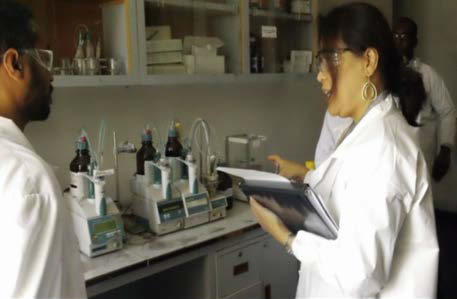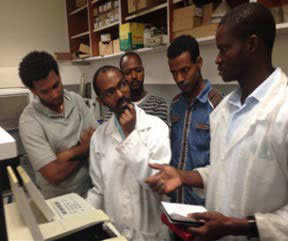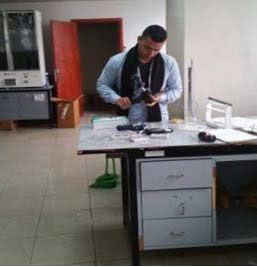A critical area of focus for the EFMHACA is the national quality control laboratory (NQCL). The NQCL’s mandate is to assess the quality of medicines, food, and medical devices to generate data required for product registration and post-marketing surveillance (PMS). However, varying challenges, including weak quality management systems (QMS), limit the capacity of the laboratory to produce analytical reports that meet international standards. Global standards, such as ISO 17025 and World Health Organization (WHO) prequalification are required for national laboratories to generate data that are recognized and globally accepted. To address these challenges the Promoting the Quality of Medicines (PQM) program intervened to build the local capacity of NQCL staff for a strong QMS.
To understand the scope of the challenges and problems faced by NQCL, PQM conducted a rapid assessment through which several gaps were identified:
- Limited laboratory infrastructure
- Weak quality management system
- Instruments that were not calibrated
- Lack of laboratory participation in any proficiency testing or inter-laboratory comparison schemes
- Lack of internal or external quality auditing systems
- Inadequate technically skilled human resources
With these challenges, PQM agreed to work with EFMHACA management and laboratory staff to implement interventions aimed at building the capacity of the laboratory to fulfill its mandate of protecting public health using internationally recognized best practices.
As a start, EFMHACA decided to relocate the laboratory to a new building. PQM provided technical support in design qualification in order to optimize operations at the new location. Technical support was also provided in identifying the equipment needed to furnish the new facility, in accordance with the requirements for good laboratory practices. PQM supported the transfer of equipment from the old location to the new, as well as the subsequent installation, qualification, and validation of the equipment.
PQM offered targeted trainings to staff on major analytical testing techniques and QMS in order to improve competency in NQCL’s standards of practice. The local trainings were supplemented by short-term courses and attachments of staff to other accredited laboratories outside of Ethiopia. In addition, seven quality manuals and more than 100 standard operating procedures were developed/updated and implemented to strengthen the QMS.
An instrument maintenance strategic plan was established to ensure the continuous maintenance and calibration of all laboratory equipment. PQM facilitated the participation of NQCL in proficiency testing at the international level. PQM also worked with the laboratory to prepare for ISO 17025:2005 accreditation, which was successfully accomplished. Following accreditation, PQM provided continued technical assistance in maintaining accreditation and continuing proficiency testing. These interventions have led to significant improvements in the quality management of the laboratory and enhanced its operations to detect falsified and substandard medicines on the market.
Learning from previous successes, EFMHACA opened four regional quality control laboratories in 2016 and is now involved in quality testing of medicines using the Minilab™ field-based kit and compendial methods. These laboratories are now supporting national efforts in monitoring the quality of medicines through routine PMS. Thus far, the four laboratories have tested well over 670 samples collected as part of the implementation of risk-based marketing surveillance.
To support its growing need for instrument maintenance, EFMHACA established a laboratory equipment maintenance unit, a result of continued advocacy by PQM. As part of instrument maintenance support, PQM supported EFMHACA to enter a contractual agreement with a local equipment supplier for the maintenance of major laboratory instruments. With this contract completed, EFMHACA is now receiving preventive and corrective maintenance of the instruments, limiting testing disruption.
Following PQM’s work with EFMHACA, the laboratories have developed confidence in technical skills to support the generation of evidence of falsified and substandard medicines in Ethiopia. EFMHACA is able to take regulatory actions using data generated by the laboratory. Prior to accreditation of the laboratory, taking regulatory actions on the basis of quality control testing was rarely exercised.
With the increasing capacity and confidence of the laboratory, the number of samples tested per year has also increased dramatically.
The leadership and technical staff appreciated the benefit of generating credible results by an accredited laboratory. Consequently, there was renewed commitment on all sides to work together in achieving accreditation for the benefit of public health in Ethiopia. The greatest challenge was equipment maintenance and calibration requirement for uninterrupted quality control testing medicines even after the lab received initial accreditation. PQM approached this challenge in a manner to address it progressively; i.e., while the immediate needs were handled through external consultants, capacity building continued in country to create the service available locally in the long term. This ultimately resulted in total ownership of maintenance services by EFMHACA using internal resources and outsourcing to a local company. PQM’s effort to build the capacity of the local maintenance support agency resulted in continuous maintenance of EFMHACA instruments with no disruption of services. The use of this local resource to calibrate the equipment in 2017 alone has already reduced maintenance costs by 58 percent. These successes encouraged EFMHACA to take additional commitments and ownership of many activities that were directly supported through PQM. Designing a comprehensive package of interventions to address all bottlenecks identified through the gap assessment is key to progressive improvements and subsequent ownership by the local counterparts to ensure sustainability.



